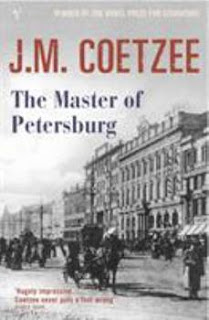Sobriquet 39.4
Like most Monday-Wednesday-Friday afternoons, I returned home from work today and promptly napped for several hours. Despite the sleeping, however, I did manage to go over another article on The Master of Petersburg. Michael Marais, it seems, is one of the more prevalent names among Coetzee scholars, as this is the third essay of his I have encountered in a relatively short period of time.
Marais's "Death and the Space of the Response to the Other in J. M. Coetzee's The Master of Petersburg," like many of the other essays dealing with the novel, focuses on the relationship between fiction and history. Using the rather common criticism that Coetzee's fiction does not engage with the politics of South Africa in any defined way as a starting point, Marais examines the author's claim that literature can rival rather than supplement history. Although it will in all likelihood have little bearing on the shape of my own work with Coetzee, Marais's essay does strike me as the type of criticism many other critics-to-be would benefit from reading.
For tomorrow: Try to write some more...
Though I do not want this blog to veer too far away from the documentation of my dissertation, I am compelled to briefly address tomorrow's massive "Super Tuesday" primary elections. A number of my friends have been swept up by the political fervor of certain campaigns and I find it disturbing how readily some of the brighter people I know take the words of particular politicians at face value. At any rate, having gotten emails from a number of my friends urging me to vote for a particular candidate, I want to say that I will not be voting for Hillary Clinton, Barak Obama, Ron Paul, or any of the other candidates in tomorrow's primaries. I am, contentedly, politically unaffiliated. Furthermore, despite the oddly idealistic glasses through which some of my brighter friends have somehow decided to view certain unnamed candidates, I have very strong doubts about the front-running candidates. All of them.
Granted, the president is largely America's diplomatic figurehead and I would hope the next president will represent our nation abroad with dignity and class, so I would prefer certain candidates over others strictly on the basis of their charisma...having lived abroad, I can say that the difference between the international response to Bill Clinton or George H. W. Bush and George W. Bush is night-and-day...we need someone the media in other countries will like. Still, I will not be voting for Hillary Clinton or Barak Obama or John McCain or Mitt Romney or Mike Huckabee, no matter how charismatic they may be.
Again, I will not attack any one candidate, though I do think there are more than a few sociopaths running and, like Ted Bundy before them, they've got people fawning over them...
I will, however, endorse one candidate for tomorrow: Mike Gravel. Whether or not he'd make a good president, I respect what he has done with his career and he says things that none of the top-tier candidates want to say or hear. A vote for Gravel, it seems, would be a nice way of sending a message, however small, that common sense and individual liberty are important. If Sen. Gravel runs as a third-party candidate (with some Libertarians drooling at a cross-party Gravel-Paul ticket), I say vote for him there, too. You're not throwing your vote away by voting for a third party; you're making a small voice that much louder. And, believe me, we need that voice to get louder, we need third parties. Imagine if the Greens and Libertarians had a few seats in Congress...If you want a government to represent the people, you'll want a Communist, a Fascist, a handful of Libertarians, a smattering of Greens, a few dozen Socialists, a bunch of Democrats and a slew of Republicans. Take that first step now...take a voice away from the Big Two and vote for a small three.




Comments
Post a Comment